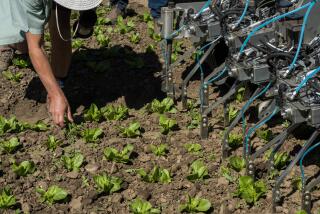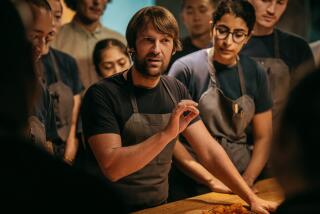Be Not Afraid, Use Genetics to Feed the World’s Hungry
- Share via
The fast-waning 20th century has brought tremendous improvement in the human condition. People live longer, healthier lives than they did 100 years ago, largely because of stunning advances in medicine and agriculture.
These advances include products of genetic engineering. Former President Carter, whose Carter Center is doing outstanding work on agricultural production in the developing world, says that by increasing crop yields, genetic engineering reduces “the constant need to clear more land for growing food. Seeds designed to resist drought and pests are especially useful in tropical countries, where crop losses are often severe.” Carter makes clear that the poorest, hungriest people of the world have the most to lose in the public relations assault on new bioengineered foods.
Science deserves most of the credit for advances in food production and nutrition, but so do education, the economics of wealth-creation, philanthropy and enlightened political leadership. Together these have put to rest the old Malthusian fear that population would outstrip our capacity to feed the world and that there was nothing we could do about it. There was something, and we did it: Today we feed 6 billion people much better than we fed 4 billion 20 years ago.
Yet this is no time to rest on our laurels. The 1996 U.N. World Food Summit reported that 800 million people are chronically undernourished, and the International Food Policy Research Institute projects that we will have to increase grain production 40% by 2020 just to keep up with population growth. We can do that; but to bring better nutrition and more food to the neediest people of the world, we have to use every resource at our disposal.
Superstition and sheer misunderstanding, however, are being used to browbeat the public--particularly in Europe, but increasingly in the U.S.--into opposing agricultural biotechnology, which the world needs to feed its growing population, improve nutrition and head off famine.
Despite numerous studies, there are no known hazards associated with bioengineered foods, which sound science shows to be as safe as--or safer than--the foods that have been on supermarket shelves for a generation. Norman Borlaug, who won the Nobel Peace Prize in 1970 for his work to attack world hunger with better food crops and who now heads the Carter Center’s effort to improve crop yields in Africa, points out that what some in Europe are calling genetically modified foods are just advances in conventional plant breeding, which has been used for years to increase yields, nutritional value and pest and disease resistance.
Some critical studies of genetically engineered crops merit further investigation, while others can’t meet the basic standards of scientific peer review. Surely we can agree on sound science standards for bioengineered crops, as we should for all scientific breakthroughs with commercial applications.
The extremist opposition may be satisfied with nothing less than halting the agricultural advances altogether. Already, Archer-Daniels-Midland Co. has asked farmers planting its genetically engineered soybeans to segregate those crops, and Monsanto is apologizing for bringing more disease-resistant crops to market.”Solid scientific evidence” has been all too lacking in this debate--a war of words and slogans, not ideas and initiatives. Let us suggest some facts that must not be forgotten: Without dramatic improvements in crop yields, people will starve; they will suffer disease and death from malnutrition. The world’s wildlife, habitats, endangered species and entire ecosystems will be put at risk as we are forced to draw more agricultural land into production. Pest-resistance, which we now know can be bred precisely into plants, will be supplanted by wider use of chemical pesticides. The promise of improving the nutritional value of indigenous crops in the developing world may be lost for a generation.
Is this what the radicals want? Surely not. Those of us in affluent societies have the luxury of pondering such questions. In doing so, we have an obligation to give the benefit of the doubt to innovations in science and technology that will most aid those who are less fortunate than ourselves.
Britain’s Prince Charles, in his multi-pronged attack on the entire bioengineered foods industry, asserts that “where people are starving, lack of food is rarely the underlying cause.” Let the prince eat cake. The people of the Sahel region, south of the Sahara, have no such luxury. It is our moral duty to help them with the most promising means available to us, and that must include applying advanced biotechnology to agricultural production.






